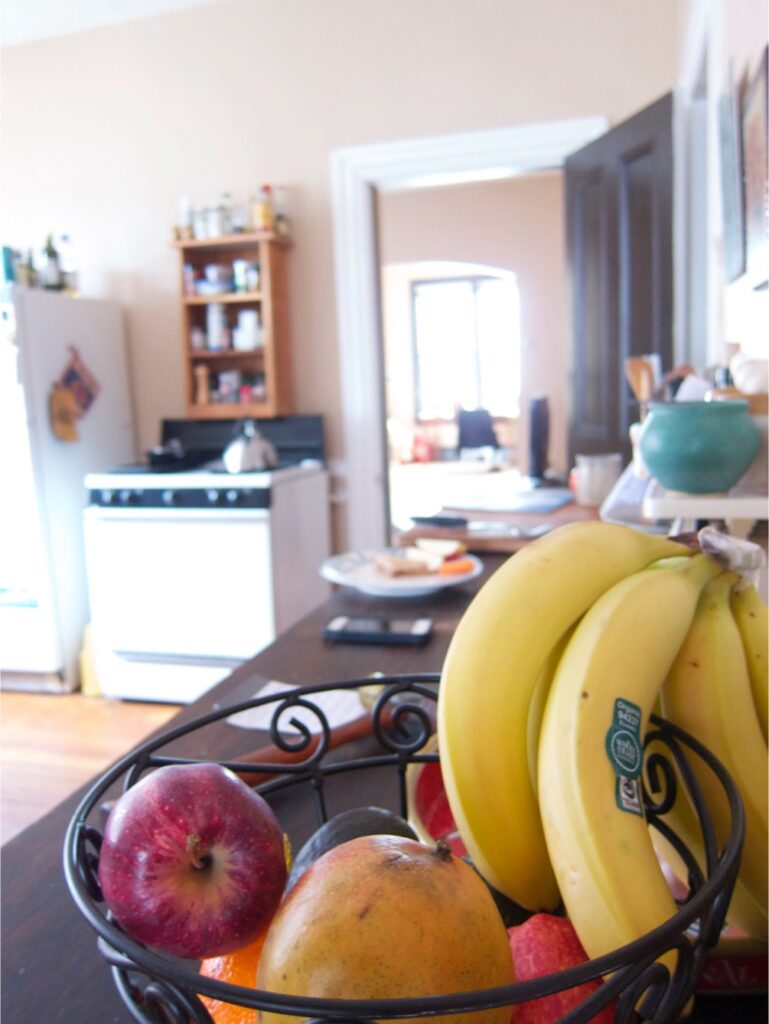Tess Bird
medical anthropologist, writer, editor, consultant

Encouraging Providence
Uncertainty, Wellbeing, and the Making of New American Futures in the Home
Initial approach: I conducted a year-long (2015-2016) exploratory study of health and wellbeing in middle class households in Providence County, Rhode Island. Most health researchers have gone into homes to study specific health concerns or technologies (e.g. diabetes care, elderly care, caring for children with disabilities), but few researchers have explored health and wellbeing in the home as a generalized phenomenon of everyday life. This study took an adapted everyday material culture approach to the home, as defined London anthropologists Daniel Miller, Fiona Parrot, and Inge Daniels. The material culture approach strengthens interview data by paying particular attention to the mundane backstage habits of the home, material objects, and the energy or atmosphere of the home.
Methods: Participants were recruited through a snowball, or word of mouth approach, which is common in household ethnographies. I conducted two open-ended interviews with individuals and couples, including dynamic mapping of everyday routines, where participants walked me through their homes while they acted out a typical day. These interviews were 3 to 12 months apart to account for changes, and depending on when participants joined the study. I also photographed the home and used object-elicitation techniques to further our material interactivity. In a subset of willing households (50%), I also conducted extensive participant observation within their homes, neighborhoods, and communities over the course of the year.
Ethnographic pivot: Every good ethnographic study has a pivot, or the point when your study changes as you discover what matters to the community in which you are working (this is similar to a grounded theory approach). It turned out the key health and wellbeing concerns of the combined households were stress and anxiety. Fascinatingly, every single household was recovering from, going through, or about to go through a major life transition (if not several at once). I quickly pivoted my research to ask: how do households negotiate uncertainty and sustain wellbeing during transition and change?
Findings: People negotiate the uncertainties provoked by transitions and change through a complex web of coping mechanisms and transformative acts. Material objects and mundane daily habits are prominent: from consuming alcohol and other substances, to the comforts of stocking, cooking, and eating food. Bodywork activities are also common, including physical activity and meditation. The specific ways that participants narrated their experiences and lives also related to their sense of wellbeing during periods of instability. Some had fixed, rigid narratives that provided limited room for responding to changes while others had expansive identities that allowed for adaptation. The cultivation of positive household energy also appeared to be key in sustaining a sense of security as external experiences brought uncertainty.
The most impactful finding was about household sociality. There is a common, American myth that self-reliance and rugged individualism is what makes people capable of withstanding life’s dramas. This research, however, draws attention to how often people make decisions in relation to others. Intimate care for others, be they partners, children, pets, or friends, sustains individuals as their lives shift, crumble, or emerge into something new. This research furthers critiques in academia, and particularly in the medical sciences, of an over-emphasis on the individual body; specifically, it critiques the assumption that an individual can change their behaviors through sheer willpower, despite daily social and environmental pressures.
Output: In addition to writing a thesis entitled, “Encouraging Providence: Uncertainty, Wellbeing, and the Making of New American Futures in the Home” (2018), I have published on the creative potential on uncertainty for the Journal of Organizational Ethnography (2019), on yoga and intimate sociality in Anthropology and Medicine (2021), and co-published on using refrigerators as a method of analysis in Social Science and Medicine (2022). I am currently working on a book that details these findings as well as those of a subsequent study into uncertainty management and wellbeing.
Acknowledgements: This research was reviewed and approved by the University of Oxford Central University Research Ethics Committee (CUREC). I am grateful for the constant support of my supervisors, Professor Stanley Ulijaszek and Dr. Inge Daniels. I am also indebted to my participants, who made this work possible.
Thank you to my participants!





